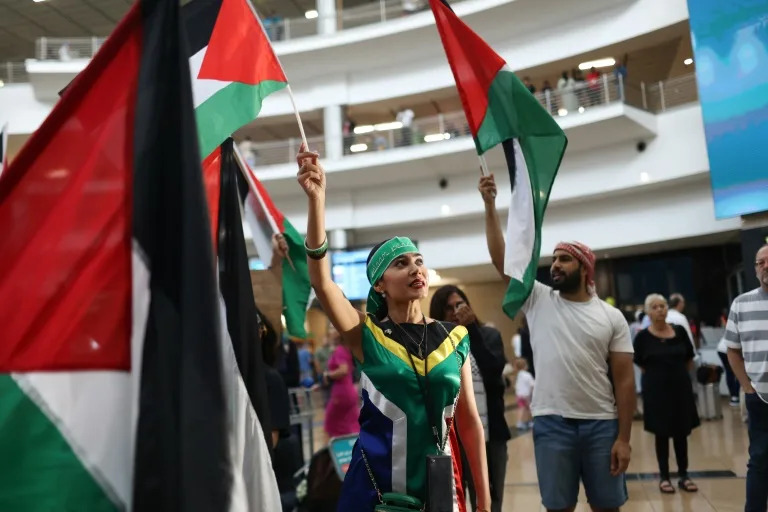It's not enforceable. It doesn't say if Israel is committing genocide. What's ICJ's Gaza ruling for?

A panel of 17 judges at the Hague-based International Court of Justice on Friday ordered Israel to implement a series of measures aimed at averting genocide in the Gaza Strip.
A Palestinian man holds a portrait of late Palestine Liberation Organisation leader Yasser Arafat and South Africa's anti-apartheid icon Nelson Mandela outside a municipality building in Bethlehem in the occupied West Bank.
The order is part of a wider case brought by South Africa at the U.N.'s highest court into whether Israel is already committing genocide against Palestinians in Gaza as it fights the war against Hamas.
Even though the ruling is not enforceable, and the actual legal case as to whether Israel is guilty of genocide is expected to take several years to wend its way through the court, the order is more than just symbolic.
Here's what the ICJ's order, which Palestinian Minister of Foreign Affairs Riyadh Maliki has described as a ruling in "favor of humanity and international law," means for the Israel-Hamas war.
What impact will the ICJ ruling have on Gaza?
Perhaps not a lot immediately in terms of a material change to conditions on the ground.
South Africa had asked the court to issue an emergency order to compel Israel to commit to a cease-fire in Gaza. It didn't do that. Instead, it ordered Israel to undertake actions to prevent the killing and harming of civilians in Gaza, such as refraining from killing members of a group and not imposing conditions that could prevent women from giving birth. It ordered Israel to prevent and punish public comments that incite genocide.
Still, even if the ICJ had demanded that Israel halt its military campaign, the court has no formal way to implement this order -- and Israel has made it clear that it only intends to stop fighting when Hamas is defeated, and Israel gets all of its hostages back. "We will continue to do what is necessary to defend our country and defend our people," Israeli Prime Minister Benjamin Netanyahu said Friday, speaking after the court's ruling.
Meanwhile, Palestinian lawmaker Mustafa Barghouti said that because of the scale of destruction and ongoing fighting in Gaza, "Israel cannot implement ICJ decisions without an immediate and permanent ceasefire."
What pressure does this put on the U.S.?
There are some big potential implications for the U.S., long Israel's staunchest military and diplomatic ally. The U.S. is facing increasing pressure to twist Israel's arm and stop a war that has killed more than 26,000 Palestinians, mainly civilians, according to the Hamas-run Gaza Health Ministry.
For a start, because the ICJ has no real mechanism to enforce its decisions, the matter could be pushed to a vote in the U.N. Security Council, where members can order economic sanctions or military action.
If a U.N. Security Council vote does happen, "the Biden administration will once again face the choice of protecting Israel politically by casting a veto, and by that, further isolate the United States, or allowing the Security Council to act and pay a domestic political cost for 'not standing by Israel,'" said Trita Parsi, the co-founder and executive vice president of the Quincy Institute for Responsible Statecraft, a Washington, D.C. think tank.
Nancy Okail, president and CEO of the Center for International Policy think tank in Washington, D.C., said that the ruling from the ICJ "is more than a legal technicality; it's about safeguarding human rights on a global scale."
So far, the White House hasn't said much about the ICJ's ruling − even whether it respects the decision.
Okail said this sends the wrong message.
"If we support the creation of a global community based on shared rules rather than simply might makes right, it is absolutely essential that all countries, including the United States, acknowledge the legitimacy of this ruling and take necessary steps in response," said Okail, in emailed comments.
What happens now?
The ICJ has ordered Israel to report, within a month, back to the court detailing what it's doing to uphold all the measures within its power to prevent acts of genocide in Gaza. Israel has not said whether it will comply with this.
In fact, after the ruling some of Israel's most senior officials such as its Defense Minister Yoav Gallant and Foreign Minister Israel Katz expressed disappointment, as well as a tone of defiance.
"The state of Israel does not need to be lectured on morality in order to distinguish between terrorists and the civilian population in Gaza," Gallant posted to social media. "The IDF and security agencies will continue operating to dismantle the military and governing capabilities of the Hamas terrorist organization."
Katz said Israel was committed to international law that existed "independently of any ICJ proceedings."
Attention now turns to reports in recent days suggesting President Joe Biden plans to dispatch CIA Director William J. Burns to the Middle East to help broker a deal between Hamas and Israel that would involve the release of all remaining hostages held in Gaza and the longest cessation of hostilities since the war began last year.
South Africa's genocide case against Israel rallies Global South support
South Africans wave Palestinian flags as they wait to greet members of the country's legal team bringing a case against Israel at The Hague.
South Africa's bid at The Hague to compel Israel to stop its Gaza campaign in a landmark genocide case has found support across the developing world from Latin America to Southeast Asia.
Israel has reacted angrily to the case, calling it "absurd", but the South African lawyers sent to argue it have been celebrated at home and online by supporters of the Palestinian cause.
The International Court of Justice (ICJ) is expected to hand down a ruling Friday on whether to impose emergency orders on Israel, though a decision on the genocide claims at the heart of the case will likely take years.
"The ICJ must see the frustration of the international community," said Hikmahanto Juwana, international law professor at the University of Indonesia.
"There should be a response."
Experts say South Africa's emergency case alleging a breach of the 1948 UN Genocide Convention in Gaza has laid bare a growing rift between Israel and its Western allies, and nations in the Global South.
International justice "has long been perceived by the Global South as selective justice", said Johann Soufi, an international lawyer and former legal office chief at the UN agency for Palestinian refugees (UNRWA) in Gaza.
"The countries of the 'South' are increasingly rejecting this view, which they consider neocolonial."
The war in Gaza was sparked by Hamas's unprecedented attacks on October 7, which left about 1,140 people dead in Israel, mostly civilians, according to an AFP tally.
Israel vowed to annihilate the Islamist movement in response, launching a punishing offensive in Gaza that the Palestinian territory's Hamas-run health ministry says has killed at least 25,900 people, about 70 percent of them women and children.
Tal Becker, a top lawyer representing Israel at the ICJ, said South Africa had put forward "a profoundly distorted" picture, and stressed that Israel's response was in self-defence.
Using visual aids, Becker said Hamas had "tortured children in front of parents, burned people... systematically raped and mutilated", in attacks that evoked memories of the Holocaust.
- Double standards -
As the war's civilian toll soared and diplomatic ceasefire efforts sputtered, backers of the Palestinian cause have looked to legal routes to halt the violence.
The loudest supporters of the ICJ case have included Muslim-majority states Iran, Turkey, Jordan, Pakistan, Bangladesh, Malaysia and the Maldives.
They also include a slate of leftist-ruled Latin American nations including Bolivia, Colombia, Brazil and Venezuela.
Brazil's Luiz Inacio Lula da Silva has been the most active Latin American leader, accusing Israel of "acts of terrorism".
Israel's strongest ally the United States has opposed the case, and some European Union members and Britain have refused to support it, with France saying accusing Israel of genocide "crosses a moral threshold".
Unlike its neighbours, India also hasn't backed the case.
"I'm not so sure that everyone in the West is in favour of Israel and everyone in the Global South is opposed to Israel," said Marco Sassoli, international law professor at the University of Geneva.
"Both Western States and the Global South have double standards. Double standards are a poison for the credibility of international law," he added, pointing to Western policy on the Ukraine war, which has largely opposed Russian aggression.
Some supporters of the case are also not signatories of the 1948 genocide convention, which was signed after the Holocaust, leaving them hesitant to officially sponsor South Africa's action.
One of them is Muslim-majority Indonesia where military-backed, anti-communist purges in the mid-1960s -- some of the worst of the 20th century -- killed at least 500,000 people.
Rather than lend its full support to the case, Jakarta instead provided an advisory legal opinion to the ICJ calling for international law to prevail, according to University of Indonesia professor Juwana, who helped craft it.
- 'Moral and political' -
But even in South Africa there are voices critical of the action, which the ruling African National Congress (ANC) sees as inspired by the teachings of the late Nelson Mandela.
Some Christian leaders condemned it as "fundamentally flawed", while South Africa's Jewish Board of Deputies expressed "concern" to President Cyril Ramaphosa that the case could fuel anti-Semitism at home.
A ruling in favour of South Africa could legally oblige Israel to stop its campaign.
But some of the supporting nations are conscious it may have little impact.
Great powers who "generally do not abide" by the court's decisions have the ability to exert pressure on it, said Roberto Goulart Menezes, professor at the University of Brasilia.
Brazil also knows a decision might only have a "moral and political" value, but would nonetheless add weight to ceasefire calls, he added.
Still, Soufi warned Washington and its allies to take South Africa's case seriously and to listen to the developing world, which is increasingly using the levers of international law and justice to hold the West to account.
"If the United States and their allies maintain their position against this new trend... they will significantly, and perhaps permanently weaken a system they took 75 years to build," he said.
Hamas welcomes UN court ruling as it fires rockets on Israel -
Hamas celebrated a UN court’s ruling as it fired rockets at Israel.
Air raid alarms rang out in Israel after the International Court of Justice (ICJ) ordered it to “take all measures within its power” to prevent genocide taking place during its military campaign in Gaza.
Hamas appears to have targeted the south of Israel, where attacks have become increasingly rare amid claims the group is running out of missiles. Rockets were sighted over the city of Ashkelon for the first time in two weeks.
Sami Abu Zuhri, a senior Hamas official, said the ruling would isolate Israel and expose its crimes in Gaza, adding: “We call for forcing the occupation to implement the court’s decisions.”
Benjamin Netanyahu, the Israeli Prime Minister, criticised the ICJ for listening to the “outrageous” genocide claims, while National Security Minister Ben Gvir said: “They were silent during the Holocaust.”
Hamas massacred 1,200 people when it breached Israel’s border wall on Oct 7, prompting Mr Netanyahu to respond with a full scale military operation later that month.
- Questions and Answers
- Opinion
- Story/Motivational/Inspiring
- Technology
- Art
- Causes
- Crafts
- Dance
- Drinks
- Film/Movie
- Fitness
- Food
- Jeux
- Gardening
- Health
- Domicile
- Literature
- Music
- Networking
- Autre
- Party
- Religion
- Shopping
- Sports
- Theater
- Wellness
- News
- Culture
- War machines and policy



